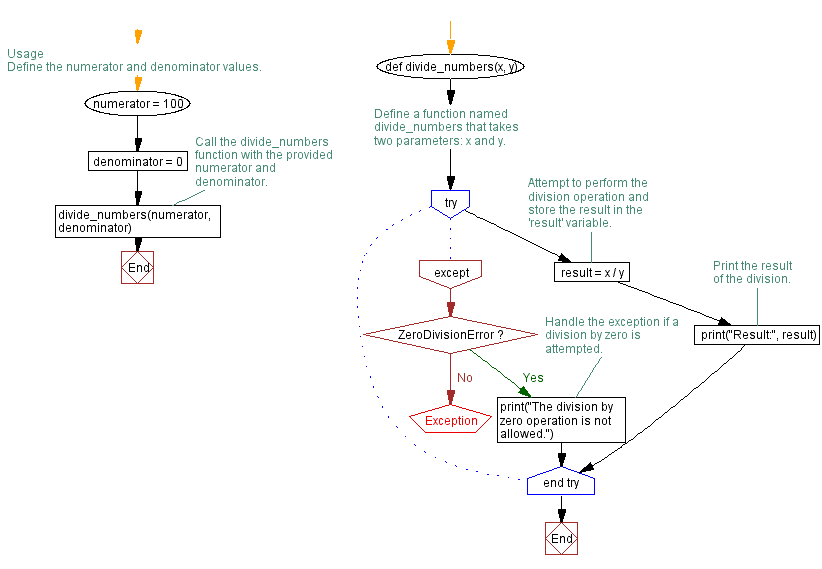Python ZeroDivisionError Exception Handling
1. Handle ZeroDivisionError Exception
Write a Python program to handle a ZeroDivisionError exception when dividing a number by zero.
exception ZeroDivisionError:
Raised when the second argument of a division or modulo operation is zero. The associated value is a string indicating the type of the operands and the operation.
Sample Solution:
Code:
# Define a function named divide_numbers that takes two parameters: x and y.
def divide_numbers(x, y):
try:
# Attempt to perform the division operation and store the result in the 'result' variable.
result = x / y
# Print the result of the division.
print("Result:", result)
except ZeroDivisionError:
# Handle the exception if a division by zero is attempted.
print("The division by zero operation is not allowed.")
# Usage
# Define the numerator and denominator values.
numerator = 100
denominator = 0
# Call the divide_numbers function with the provided numerator and denominator.
divide_numbers(numerator, denominator)
Explanation:
In the above exercise -
The "divide_numbers(0)" function takes two parameters, x and y, representing the numerator and denominator respectively. The try block within the function attempts to perform the division operation x / y.
If the division operation succeeds, the result is printed. However, if a ZeroDivisionError exception occurs because the denominator y is zero, the program jumps to the except block. The except block prints an error message indicating that division by zero is not permitted.
Output:
The division by zero operation is not allowed.
Flowchart:

For more Practice: Solve these Related Problems:
- Write a Python program that wraps a division operation in a try-except block and prints a custom error message when a ZeroDivisionError occurs.
- Write a Python program that uses a function to perform division and raises a ZeroDivisionError if the denominator is zero, then catches and logs the exception.
- Write a Python program to prompt the user for two numbers, perform division, and handle ZeroDivisionError by asking for input again.
- Write a Python program that uses a decorator to automatically catch ZeroDivisionError for any function that performs division and prints a fallback value.
Go to:
Previous: Python Exception Handling Exercises Home.
Next: Handling ValueError Exception in Python integer input program.
Python Code Editor:
What is the difficulty level of this exercise?
Test your Programming skills with w3resource's quiz.
